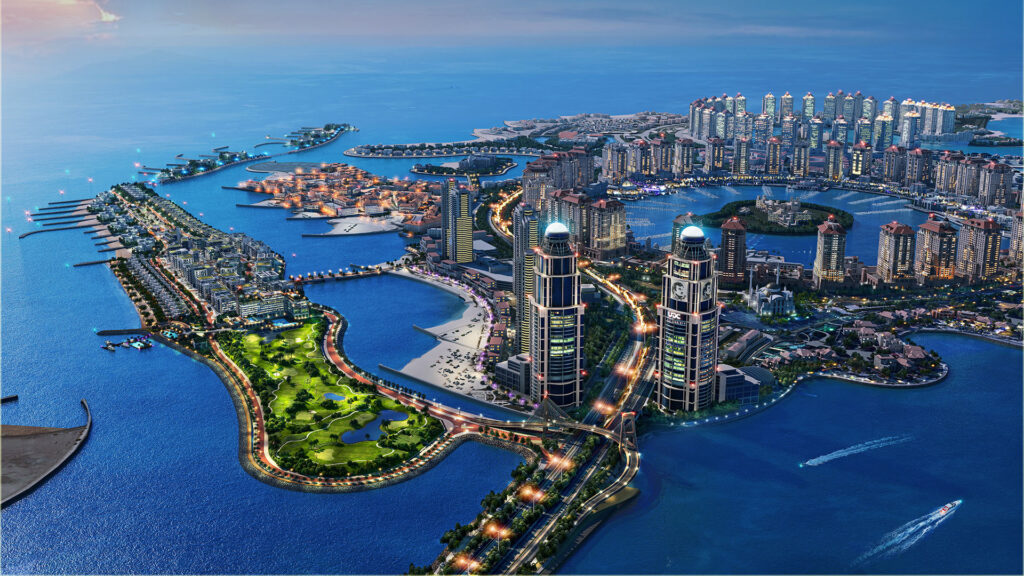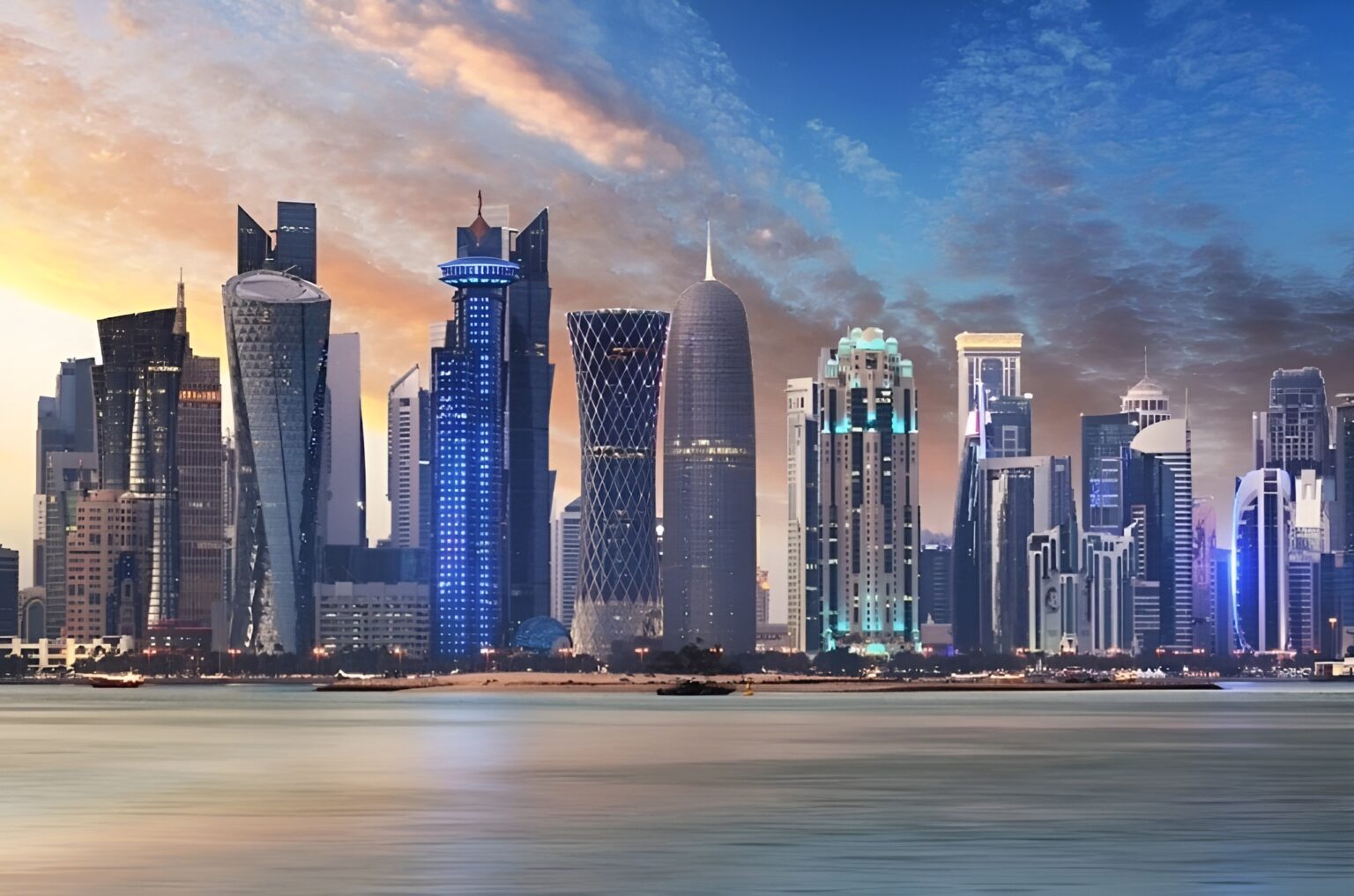Qatar’s real estate sector is experiencing a remarkable surge, fueled by strategic investments across multiple industries. This growth reflects the country’s broader economic vision, which aims to diversify revenue sources beyond hydrocarbons. With increasing investments in residential, commercial, tourism, and technology-related projects, Qatar is cementing its position as a key real estate and investment hub in the Middle East.
Real Estate Transactions on the Rise
In recent months, Qatar has witnessed a significant increase in real estate transactions. December 2024 alone saw property transactions exceed $836 million, highlighting strong investor confidence. The number of deals registered by the Ministry of Justice reached 283, marking a 12% rise compared to the previous month.
The most active locations for transactions were Doha, Al Rayyan, and Al Dhaayen. Doha, the capital, led with transactions worth approximately QR378 million ($104 million), followed by Al Rayyan and Al Dhaayen. These areas are known for their high-end residential and commercial developments, attracting both local and foreign investors.

Experts suggest that Qatar’s real estate growth is driven by government-led infrastructure projects, foreign investment policies, and an increasing demand for high-quality residential and commercial spaces. The country’s reputation as a stable economy with investor-friendly policies is further boosting real estate activity.
Mortgage Transactions Soar
A key driver of the real estate market’s expansion is the rising demand for mortgage financing. The fourth quarter of 2024 saw a staggering 172.3% annual increase in mortgage transactions, totaling approximately QAR25.2 billion ($6.91 billion). This unprecedented surge indicates a shift in investment patterns, with more individuals and businesses opting for long-term property investments through bank financing.
Doha recorded 95 mortgage deals worth over QAR16.4 billion, the highest transaction value in five years. This rise in mortgage-backed transactions highlights the growing confidence in Qatar’s financial sector and real estate market. Banks and financial institutions are offering attractive interest rates and flexible repayment options, making property investment more accessible to a wider range of buyers.
The increase in mortgage financing also suggests a shift towards long-term property ownership rather than short-term speculative buying. With Qatar’s government encouraging foreign property ownership in designated areas, expatriates and international investors are also contributing to this trend.
Diversification Beyond Traditional Real Estate
One of the key factors driving the real estate market is Qatar’s diversification strategy. While residential and commercial properties continue to attract investors, new projects in entertainment, tourism, and technology are also playing a crucial role in boosting the real estate sector.
A major example of this diversification is the upcoming ‘Land of Legends’ theme park, a joint venture between FTG Development and Qatari Diar. Expected to open by 2028, this $2.3 billion project will span 650,000 square meters and include seven themed areas. Designed to attract up to two million tourists annually, the development aligns with Qatar’s vision of becoming a global entertainment and tourism hub.
Qatar’s hosting of major international events, including the FIFA World Cup 2022, has already transformed the country’s tourism landscape. With increased investment in luxury hotels, resorts, and leisure attractions, the real estate market is benefiting from a rising influx of visitors and business travelers.
Investment in Technology and AI-Driven Infrastructure
Beyond tourism and entertainment, Qatar is also making significant investments in technology-driven real estate projects. Ooredoo, the country’s leading telecom provider, recently announced a $550 million investment in expanding its regional network of data centers. These centers will play a key role in supporting artificial intelligence applications and cloud computing, further integrating technology with Qatar’s real estate sector.
With plans to build 120MW of data center capacity over the next five years, Qatar is positioning itself as a leader in AI and digital infrastructure in the Gulf region. These developments are expected to increase demand for commercial real estate, particularly office spaces tailored for tech startups and multinational companies looking to establish a presence in the region.
Additionally, the integration of smart city solutions and AI-driven real estate management is reshaping the way properties are built and maintained in Qatar. From energy-efficient buildings to automated security systems, real estate developers are adopting cutting-edge technologies to enhance the quality and sustainability of their projects.
Government Policies Encouraging Real Estate Growth
Qatar’s government has introduced several initiatives to support and stimulate real estate investment. The implementation of investor-friendly laws, streamlined property registration processes, and tax incentives have contributed to increased interest from both local and international investors.
One of the most significant policies is the introduction of permanent residency for select foreign investors. This policy allows eligible expatriates to purchase property in designated areas, providing them with long-term stability and ownership rights. Additionally, freehold property ownership has been extended to several prime locations, making Qatar an attractive destination for foreign buyers.
The government has also launched various infrastructure projects, including metro expansions, new highways, and smart city initiatives. These developments are not only improving connectivity but also increasing the value of surrounding real estate. As Qatar continues to modernize its urban landscape, property investments are expected to yield high returns.
Luxury Real Estate and High-End Developments
The luxury real estate market in Qatar is thriving, driven by an increasing demand for high-end properties. Areas such as The Pearl-Qatar, Lusail City, and West Bay are home to some of the most luxurious residential and commercial projects in the region. These developments offer premium amenities, waterfront views, and state-of-the-art facilities, attracting wealthy investors and high-net-worth individuals.
Lusail City, in particular, is emerging as a futuristic urban center with mixed-use developments, luxury residences, and high-end retail spaces. The city’s ongoing expansion includes the construction of new business districts, entertainment hubs, and residential communities, further strengthening Qatar’s real estate sector.
With growing interest from international buyers, the demand for luxury apartments, penthouses, and villas remains high. Many property developers are offering flexible payment plans and attractive incentives to lure buyers, making luxury real estate in Qatar a lucrative investment option.
The Future of Qatar’s Real Estate Market
As Qatar continues to implement its economic diversification strategy, the real estate sector is set for sustained growth. The combination of strong government support, increased foreign investment, and a dynamic mix of residential, commercial, and tourism-related projects will ensure the market remains resilient.
The integration of smart technologies, the rise of mortgage-backed property transactions, and Qatar’s commitment to infrastructure development are all contributing to a thriving real estate ecosystem. With a focus on long-term sustainability and innovation, the sector is expected to maintain its upward trajectory in the coming years.
For investors, Qatar presents a wealth of opportunities. Whether in luxury residential developments, commercial office spaces, or entertainment and technology-driven projects, the market is full of potential. As the country prepares for future economic milestones, real estate will remain a cornerstone of its growth strategy, reinforcing Qatar’s position as a global investment destination.
Qatar’s National Sports Day 2025: A Celebration of Fitness and Unity



